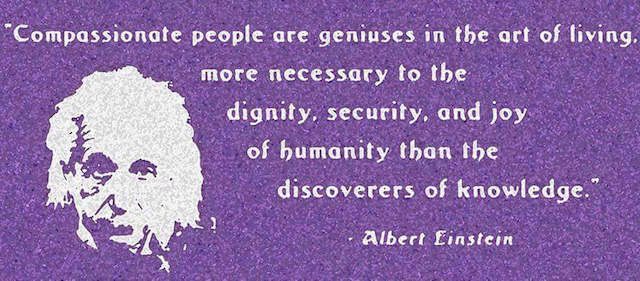
Several years ago, after retiring from my work as a yoga teacher and later as an Ayurvedic Practitioner, I deliberated over what to call my unemployed self.
In an effort to choose a title that could outlast my ever-evolving interests, I landed on “Compassion Activist.”
This was because at the heart of all my work, regardless of what temporary manifestation it takes, my aim is to connect, to feel more deeply and to live more porously.
(For the sake of this piece, I will not distinguish compassion from empathy, other than to note that compassion is farther reaching than empathy. I believe them both to be derived from the same source and work from the premise of oneness. However, I distinguish both compassion/empathy from sympathy/pity, as these latter emotions arise from the “us” versus “them” construct, e.g., “Oh, that poor person over there, who is nothing like me.”)
When I first discovered Paul Bloom’s just-released book entitled Against Empathy: The Case for Rational Compassion, I almost wrote it off as a click-bait book—someone taking advantage of a hot topic. Bloom himself writes that there are “over fifteen hundred books on Amazon with empathy in their title or subtitle.”
An internet search on the topic reveals countless websites and seminars devoted to compassion and empathy. And the wide popularity of author and researcher Brené Brown’s books on vulnerability, authenticity, connection and compassion testifies to our desire to expand into a larger blueprint of human potential. So who could seriously be against empathy?
But after downloading the book, I realized it was time that this Compassion Activist got activating. For I believe this book to be more than an argument “against” empathy. I believe it is a contribution to the resistance against the continued and persistent rise of the archetypal feminine, which takes the expressions of, and breathes into our world, as compassion, empathy, patience, love, letting go, vulnerability and other related “feminine” qualities of the heart and soul.
In other words, in writing his book, I suspect that Bloom is acting on behalf of patriarchy.
I did not land on this argument because the author is a man. I landed on this argument because of the telltale footprints of patriarchy throughout the book:
First, he co-opts and redefines the term empathy—a classic, “if you can’t beat ‘em, join ‘em” (and then own ‘em) method. (I have written previously about how patriarchy does this to yoga.)
He redefines empathy as such:
“Empathy is the act of coming to experience the world as you think someone else does,” and later as the “mirroring of emotions.”
At its simplest, his argument is that if someone is sad, empathy requires we also feel sad, feel even the same depth of sadness. If someone is angry, his definition of empathy demands we attempt to feel their exact degree of anger. He rightly points out this impossibility/unfeasibility.
I define empathy as the attempt to wholly grasp another’s situation and resulting emotional state, even if it does not (or would not) create the same emotional state in ourselves. It means to feel, with passion (com-passion), alongside another individual or group. Through empathy, we can’t take away or take on another’s pain (nor should we try), but we can validate it and respect it. In this exchange, both parties benefit.
I often ask my husband to have empathy for my daughters or myself as women in the world. And, I try to listen and offer empathy for his unique concerns as a husband and father. However neither of us will ever completely succeed in feeling exactly what the other feels, and how could we? But the attempt itself draws us closer, enriches our dialogue, and deepens our offerings to each other. To define empathy in Bloom’s narrow terms is setting us up to fail.
Second, Bloom uses patriarchal dog whistles designed to elevate a masculine approach toward life while silently diminishing the value of a feminine approach. Here are some example quotes/phrases:
“…I want to make a case for the value of conscious, deliberative reasoning in everyday life, arguing that we should strive to use our heads rather than our hearts.”
“those who are gripped by empathic feelings…”
“But doing actual good…requires [we] “step back and not fall into empathy traps.”
“A reasoned, even counterempathic analysis…is a better guide to planning for the future than the gut wrench of empathy. This is not a partisan point; it’s a sensible one.”
And my favorite, which has so many patriarchal battle cries it could define the term itself.
“More specifically, reasoning draws on observation and on principles of logic, with scientific practice being the paradigmatic case of reason at work.”
His language is either purposefully or unconsciously manipulative: who wants to get caught in a trap, be out of control, get lost in the “grip” or “gut wrench” of feelings? Most of us like to think of ourselves as logical and reasonable people.
Third, he suggests that empathy is not as powerful as we think it is.
“There are all sorts of real-world acts of kindness that are not prompted by empathic concern.”
To this one, I find myself uttering a teenager’s response: “Well, duh. How is that an argument against empathy?
Fourth, the author sets up an either/or, mutually exclusive choice.
One of the craftiest tools of patriarchal control is the maintenance of duality. As long as we see the world through “right vs. wrong” or “good vs. bad,” we remain susceptible to these arguments. He even takes time to remind us of the validity of this paradigm:
“The idea that human nature has two opposing facets—emotion versus reason, gut feelings versus careful, rational deliberation—is the oldest and most resilient psychological theory of all.”
Given this either/or scenario, who wouldn’t opt for reason with its logic, science and paradigms over empathy with its softness, mutability and lack of identifiable boundaries? The important point here is this: Empathy and reason are not mutually exclusive. As evolving human beings it is our responsibility to view ourselves, and act as, multi-dimensional beings, quite capable of feeling empathy and employing reason simultaneously.
Fifth, he asserts that empathy makes us weak.
He argues that empathy “exhausts the spirit; diminish[es] the force of kindness and love.”
There is truth to the assertion that compassion (“com”= with “passion” = suffer) is exhausting work and can be hard on the body. It takes mindfulness and diligence to engage in the daily self-care and post-care required after we willingly get out on the field of life each day and feel. But this is also true about the game of football, and I don’t see many people arguing to stop playing that.
Sixth, he creates a false belief in empathy’s measurability and scarcity.
In a chapter entitled, “The Anatomy of Empathy,” Bloom talks of people scoring “high” or “low” in empathy based on scientific tests and laboratory research. In doing so, he sneakily infers that empathy is a measurable “thing” parsed out to us in unequal amounts. I understand that empathic activity can be measured in the brain, but that does not mean that is where it is sourced.
The source of empathy and compassion is the soul, which has no limit. Empathy is not about giving away something tangible—like money or time—empathy means moving completely into an experience. Better yet, empathy means letting an experience move into us. This is not measurable.
Later, he invites the reader into his belief of empathetic scarcity, concluding by saying, “Indeed, you cannot empathize with more than one or two people at the same time.” Ergo, empathy has limitations. And speaking of limitations…
Finally, he tells us that it will never be enough anyway.
Empathy is, he tells us, “shortsighted” and “innumerate, favoring the one over the many”:
‘It does poorly in a world where there are many people in need and where the effects of one’s actions are diffuse, often delayed, and difficult to compute, a world in which an act that helps one person in the here and now can lead to greater suffering in the future.”
To counter this last point, I’d like to quote Katie Stagliano, who in 3rd grade planted a single cabbage seedling in her backyard. This cabbage seedling grew into a 40 pound cabbage that she donated to a food kitchen and went on to fed an entire community. From there, her vision of Katie’s Krops was born. (She is featured in the award-winning documentary The Starfish Throwers, and today there are dozens of Katie’s Krops growing around the country):
“Some people approach and issue and say, ‘Well this issue is too big I can’t do anything about it.’ But you never know what can grow from just one thing. You could be inspiring hundreds with just one small action.” ~ Katie Stagliano
Only patriarchy would make the case that something that is imperfect and incomplete should be rejected. Only patriarchy would suggest that feeling overwhelmed, frightened and receiving less-than-perfect results make the case for pulling back from the world. Empathy and compassion practices may be fraught with complications, uncertainties and entanglements. Yet without their gifts, what is the point of our human experiment?
Our souls know the truth: Each time we offer compassion and empathy to ourselves or others, we exercise our heart muscle. We grow stronger, wiser and kinder. We weaken patriarchy’s hold on our evolution as immeasurably-dimensioned human beings one white-knuckled finger at a time. It is that powerful.
I will end by noting that I actually enjoyed Bloom’s final chapter entitled, “The Age of Reason.” If this were a stand-alone essay, I might be his newest fan. In this chapter he shares this sentiment: “Reason and rationality, then, are not sufficient for being a good and capable person. But my argument is that they are necessary, and on average, the more the better.” I nodded along in agreement through much of this chapter, because I believe the development of empathy does not diminish the development/value/ability for reason. It is too bad that throughout the rest of this book, this is exactly the argument the author rests upon.
~
~
~
Author: Keri Mangis
Image: Flickr: Leigh Blackall
Editor: Travis May






Read 2 comments and reply